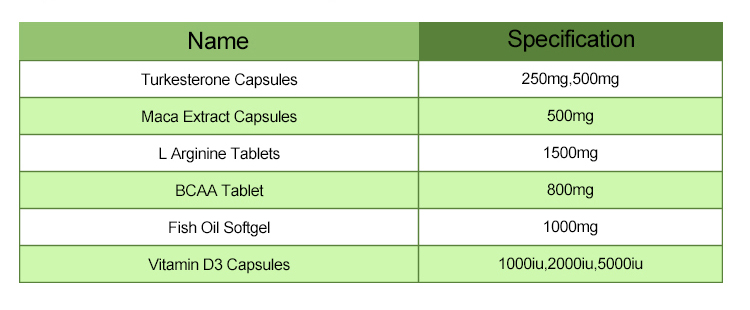Vitamin D3, also known as cholecalciferol, is a crucial nutrient that plays several vital roles in the body. It is primarily known for its role in maintaining healthy bones and teeth by aiding in the absorption of calcium and phosphorus from the diet. Here’s an overview of the efficacy and functions of Vitamin D3 capsules:
Bone Health: Vitamin D3 is essential for bone health as it helps regulate calcium levels in the body. Adequate levels of vitamin D3 are necessary for the absorption of calcium from the intestines. Without enough vitamin D3, the body cannot absorb calcium efficiently, leading to weakened bones and an increased risk of fractures.
Immune Function: Research suggests that vitamin D3 plays a role in modulating the immune system and may help reduce the risk of certain infections and autoimmune diseases. It is believed to have both anti-inflammatory and immunomodulatory effects.
Muscle Function: Vitamin D3 is also important for muscle function. Deficiency in vitamin D3 has been linked to muscle weakness and pain. Adequate levels of vitamin D3 may help improve muscle strength and function.
Cardiovascular Health: Some studies have suggested a potential link between vitamin D3 deficiency and an increased risk of cardiovascular diseases, although more research is needed to fully understand this relationship.
Mood Regulation: There is evidence to suggest that vitamin D3 may play a role in mood regulation and mental health. Low levels of vitamin D3 have been associated with an increased risk of depression and other mood disorders.
Cancer Prevention: Some studies have suggested that adequate levels of vitamin D3 may help reduce the risk of certain cancers, including colorectal, breast, and prostate cancers. However, more research is needed to confirm these findings.

Vitamin D3 supplements, usually in the form of capsules, are commonly used to prevent or treat vitamin D deficiency. They are often prescribed by healthcare providers for individuals who are at risk of deficiency, such as those who have limited sun exposure, older adults, people with dark skin, and individuals with certain medical conditions that affect vitamin D absorption.
It’s important to note that while vitamin D3 supplementation can be beneficial for those who are deficient, excessive intake of vitamin D3 can lead to toxicity, which can cause symptoms such as nausea, vomiting, weakness, and kidney damage. Therefore, it’s essential to follow recommended dosage guidelines and consult with a healthcare provider before starting any supplementation regimen, especially if you have underlying health conditions or are taking other medications.
The potential benefits of Vitamin D3 Capsules
Vitamin D3, also known as cholecalciferol, is an essential nutrient that plays numerous roles in the body. Here are some potential benefits associated with taking Vitamin D3 capsules:
Bone Health: Vitamin D is crucial for calcium absorption in the gut, which is essential for maintaining healthy bones and teeth. A deficiency in Vitamin D can lead to soft, brittle bones, a condition known as rickets in children and osteomalacia in adults.
Muscle Strength: Some research suggests that Vitamin D may help improve muscle strength, which is important for overall mobility and reducing the risk of falls, particularly in older adults.
Immune System Support: Vitamin D is believed to play a role in modulating the immune system, potentially reducing the risk of infections and autoimmune diseases. Adequate Vitamin D levels may help enhance the body’s defense mechanisms against pathogens.
Mood Regulation: There’s evidence to suggest that Vitamin D may play a role in regulating mood and warding off depression. Some studies have found an association between low Vitamin D levels and an increased risk of mood disorders.
Heart Health: Research indicates that Vitamin D may have a protective effect on the cardiovascular system. Adequate levels of Vitamin D have been linked to a reduced risk of heart disease and hypertension.
Cancer Prevention: While more research is needed, some studies suggest that Vitamin D may have a protective effect against certain types of cancer, including colon, breast, and prostate cancers.
Brain Health: There is emerging evidence suggesting that Vitamin D may play a role in cognitive function and reducing the risk of neurodegenerative diseases such as Alzheimer’s disease.

Pregnancy and Fetal Development: Adequate Vitamin D levels during pregnancy are important for both maternal and fetal health. It is essential for proper bone development in the fetus and may also reduce the risk of complications during pregnancy.
Support for Chronic Conditions: Some chronic conditions such as diabetes, multiple sclerosis, and autoimmune diseases may benefit from adequate Vitamin D levels. While not a cure, maintaining optimal Vitamin D levels may help manage symptoms and improve overall health outcomes.
It’s important to note that while Vitamin D supplementation can be beneficial, it’s also possible to have too much of it, which can lead to toxicity. It’s always best to consult with a healthcare professional to determine the appropriate dosage based on individual needs and health status. Additionally, getting Vitamin D from natural sources such as sunlight and diet (fatty fish, fortified foods) is also important for overall health.
